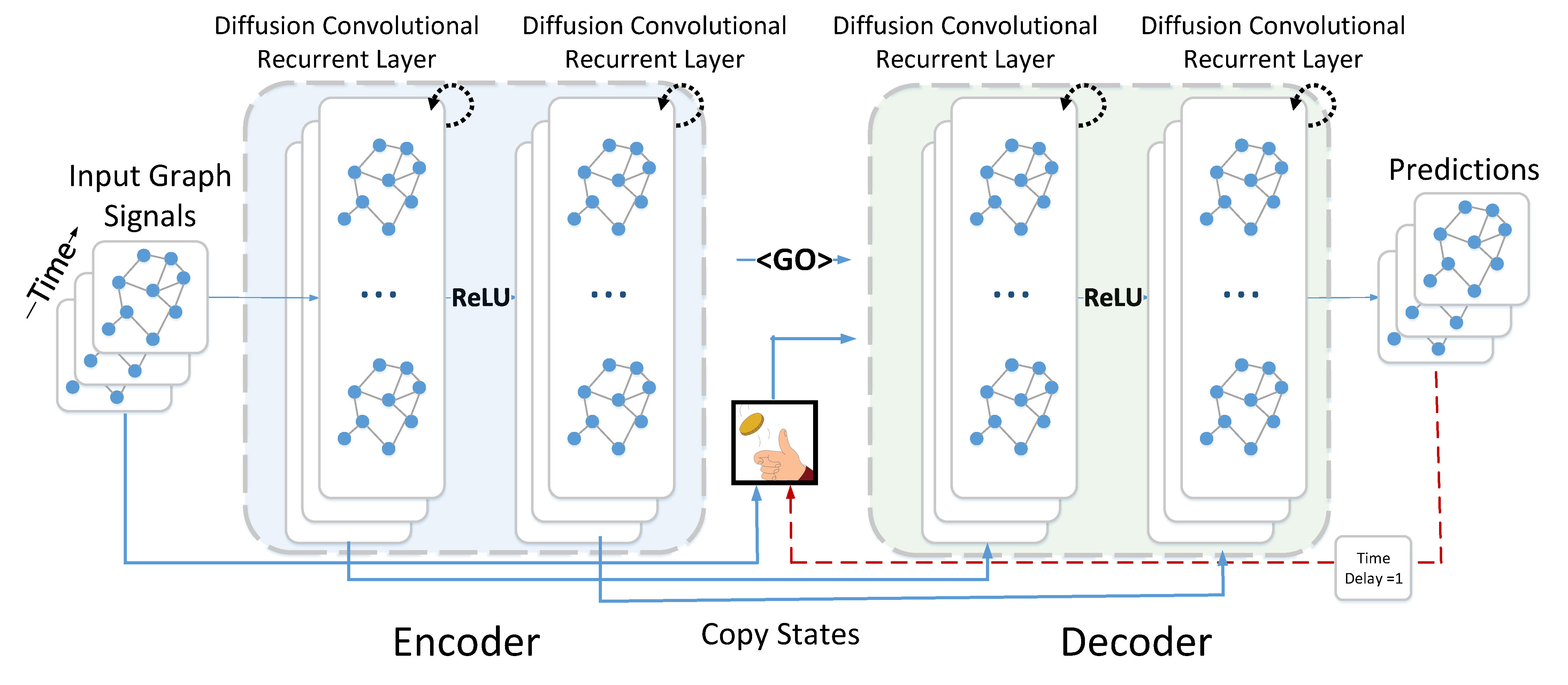This is a TensorFlow implementation of Diffusion Convolutional Recurrent Neural Network in the following paper:
Yaguang Li, Rose Yu, Cyrus Shahabi, Yan Liu, Diffusion Convolutional Recurrent Neural Network: Data-Driven Traffic Forecasting, ICLR 2018.
- scipy>=0.19.0
- numpy>=1.12.1
- pandas>=0.19.2
- tensorflow>=1.3.0
- pyaml
Dependency can be installed using the following command:
pip install -r requirements.txtThe traffic data files for Los Angeles (METR-LA) and the Bay Area (PEMS-BAY), i.e., metr-la.h5 and pems-bay.h5, are available at Google Drive or Baidu Yun, and should be
put into the data/ folder.
The *.h5 files store the data in panads.DataFrame using the HDF5 file format. Here is an example:
| sensor_0 | sensor_1 | sensor_2 | sensor_n | |
|---|---|---|---|---|
| 2018/01/01 00:00:00 | 60.0 | 65.0 | 70.0 | ... |
| 2018/01/01 00:05:00 | 61.0 | 64.0 | 65.0 | ... |
| 2018/01/01 00:10:00 | 63.0 | 65.0 | 60.0 | ... |
| ... | ... | ... | ... | ... |
Here is an article about Using HDF5 with Python.
Run the following commands to generate train/test/val dataset at data/{METR-LA,PEMS-BAY}/{train,val,test}.npz.
# Create data directories
mkdir -p data/{METR-LA,PEMS-BAY}
# METR-LA
python -m scripts.generate_training_data --output_dir=data/METR-LA --traffic_df_filename=data/metr-la.h5
# PEMS-BAY
python -m scripts.generate_training_data --output_dir=data/PEMS-BAY --traffic_df_filename=data/pems-bay.h5As the currently implementation is based on pre-calculated road network distances between sensors, it currently only
supports sensor ids in Los Angeles (see data/sensor_graph/sensor_info_201206.csv).
python -m scripts.gen_adj_mx --sensor_ids_filename=data/sensor_graph/graph_sensor_ids.txt --normalized_k=0.1\
--output_pkl_filename=data/sensor_graph/adj_mx.pklBesides, the locations of sensors in Los Angeles, i.e., METR-LA, are available at data/sensor_graph/graph_sensor_locations.csv.
# METR-LA
python run_demo.py --config_filename=data/model/pretrained/METR-LA/config.yaml
# PEMS-BAY
python run_demo.py --config_filename=data/model/pretrained/PEMS-BAY/config.yamlThe generated prediction of DCRNN is in data/results/dcrnn_predictions.
# METR-LA
python dcrnn_train.py --config_filename=data/model/dcrnn_la.yaml
# PEMS-BAY
python dcrnn_train.py --config_filename=data/model/dcrnn_bay.yamlEach epoch takes about 5min or 10 min on a single GTX 1080 Ti for METR-LA or PEMS-BAY respectively.
There is a chance that the training loss will explode, the temporary workaround is to restart from the last saved model before the explosion, or to decrease the learning rate earlier in the learning rate schedule.
More details are being added ...
If you find this repository, e.g., the code and the datasets, useful in your research, please cite the following paper:
@inproceedings{li2018dcrnn_traffic,
title={Diffusion Convolutional Recurrent Neural Network: Data-Driven Traffic Forecasting},
author={Li, Yaguang and Yu, Rose and Shahabi, Cyrus and Liu, Yan},
booktitle={International Conference on Learning Representations (ICLR '18)},
year={2018}
}
